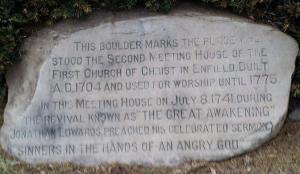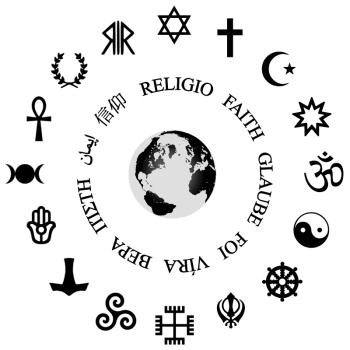Working with new generations (Gen Z) – Series
This series looks at change within the church, and the need for future change to address the spiritual needs of people age 15 to 30. It rejects the notion that the church doesn’t change. Various eras are identified in which change occurred. My labels on eras aren’t meant as formal categories.

Picture of the monument commemorating the location where Edward’s famous Sinners in the Hands of an Angry God sermon was preached. On Wikipedia.
The Great Awakening
This movement began in the 1800s. This “born again” movement saw the development of evangelical Congregationalist, Presbyterian, Baptist, and new Methodist churches. It featured a more spirited (conviction style) preaching, a deep sense of personal guilt, redemption through Christ, the personal God (as opposed to social), and an emphasis on evangelism to get converts. For many this style drove them from the church, having inflicted great pain on them.
It was marked by Catholics and Protestants rejecting each other and in the US people from different European and other countries hating each other. The battles between denominations from previous centuries that led to wars remained unresolved.
Most Methodists teach that Jesus Christ, the Son of God, died for all of humanity and that salvation is available for all, and looks to a more social justice God. The Calvinist position is that God has pre-ordained the salvation of a select group of people, and the nonbiblical teaching of predestination is common, mistaking foreknowledge for predestined.
Biblical interpretation also began to focus on “return of Christ” theology. Many groups set dates for Christ’s return and began looking for signs that the world was beyond saving and world events were happening that signaled the end. These things are judgements on the world by Christians and their view is that the world is becoming more sinful. In reality other ages have been much worse.
End times theology
End times theology was not part of church thinking from the latter days of the apostles onward. Mainstream churches don’t have “return of Christ” as a belief. The church is the body of Christ and represents him in belief and action in the world.
The events described in veiled language in Daniel and Revelation were to occur in the near future, and did. For example the destruction of the Temple foreseen by Jesus occurred in 70 CE, less than 40 years after Jesus. If there is to be an end of the world, Jesus said he didn’t know the time nor did anyone else.
Religious “fragmentation” accelerated as groups rejected some doctrines and embraced new teachings. The idea of a single group of church doctrines that all could agree on was already out the window and irretrievable.
Restoration
Many felt that the church lost its bearings and they tried to get back to the style of church and beliefs that were features of the early days of Christianity during the period of the apostles. They usually started independent churches that garnered family and friends, often driven by a charismatic pastor who builds the congregation for a while. Few of these churches become large since they usually stop growing when family and friends are exhausted as resources for membership, and most slowly shrink away and close. The number of denominations in the US has grown exponentially.
Personal God and selfishness
For Generation X and into the Millennial Generation, for many their philosophy of religion became about “No limits.” The sky was the limit and people could get whatever they wanted in life if they were willing to go after it. The personal God belief brought to life by the Great Awakening was key to getting everything you ever wanted – a very materialistic influence.
Angels were everywhere to protect and serve people. All you had to do was ask God and you would get what you wanted. This fit an era of prosperity.
Not everyone was or is prosperous. Lost in this emphasis on “personal” was any obligation to help others. Financially for many it became, “I got mine, you’re on your own.” In the US this philosophy of religion fit right in with rural areas of strong independence, shrinking populations, lack of good paying jobs, wages that didn’t keep up with inflation, and in the city areas of opulence and ever larger houses.
The ancient prophets’ and Jesus’ emphasis on social justice and helping others went out the window. Certainly not everyone is afflicted – there are many wonderful people in all denominations and religions who would give you the shirt off their back.
During this period inflation generally ran around 4% and annual medical and college inflation stayed in the double-digits. Companies regularly cancelled medical insurance for their employees, passed on medical price increases to their employees, or didn’t offer it. For people with meager jobs making a living became very difficult. In contrast in the 1990s the economy itself did well and investment clubs became very popular among many who were newly flush with money. But the economy was leaving people behind at ever growing rate that continued to today.
Take Home Points
The Puritans objected to the Church of England and the sexual immorality they saw, leading to an age of sexual repression and a host of problems.
The Great Awakening created two major divisions: Those who thought salvation was preordained by God for only some people, and others who thought salvation was for all in one form or another.
The Restoration movement tried to take the church back to the days of the Apostles without the leaders and organization. It’s still popular today.
The Personal God grew out of the Great Awakening and led some to a materialistic distortion in thinking God was their piggy bank for everything they wanted and social justice was not something they should be concerned with. This fits with the predestined outlook and is more like the Sadducee belief in that they went through the motions of religion but overlooked the weightier matters of justice and love.
There are over 200 Christian denominations in the US, and around 2000 variations. They tend not to agree on things. This certainly marks rapid and prolific change in people’s theological ideas.
The history of Judaism and Christianity is a history of change, sometimes dramatic change. The thought that one of today’s beliefs is the only right belief is a very strange idea.
Series Links
Church Eras and Chang – Part 2
The organized church – Change Part3
New Era of Change – Part 7 – LGBTQIA++
New Era of Change – Part 8 – LGBTQIA++
New Era of Change – Part 8b – LGBTQIA++
Law and Love – New Era of Change – Part 9 – LGBTQIA++
Deconstruction – New Era of Change – Part 10 – LGBTQIA+
Apostle Paul on LGBTQ – – New Era of Change – Part 11
Paul and same sex activity – New Era of Change, Part 12 – LGBTQ Final
New Era of Change – Conscience and Reassessment
Additional Resources
New Generations Walk with Jesus: The missions in a changing world (by author on Amazon). Young adults not only don’t find what they need in churches, they’re pushed away, and they have a no tolerance policy for the nonsense they see in churches. How do you minister to them? Answers.
Promiscuous America: Smart, Secular, and Somewhat Less Happy. Institute For Family Studies.
How Casual Sex Can Affect Our Mental Health. Psychology Today
https://christianstudies.wordpress.com/2011/05/14/230/
Free Speech – Rabbi Berel Wein.
Judaism and the Gays: Part 1 – Dealing with Mishcav Zachar. Oral Torah.
Sexual Morality? Is it the same today as in 1200 BCE?
Some series references:
How to Keep Millennials Engaged in Church – on Patheos
What Is Meant by Truth? – on Patheos
Tabernacle of Hate – False Religion – on Patheos
10 Reforms Christianity Needs to Make Right Now – on Patheos
The standard of belief and conduct for Christianity is love. Legal standard.
________________________
If you find these articles intriguing, please consider joining the mailing list.
___________________
Our answer is God. God’s answer is us. Together we make the world better.
– Dorian














